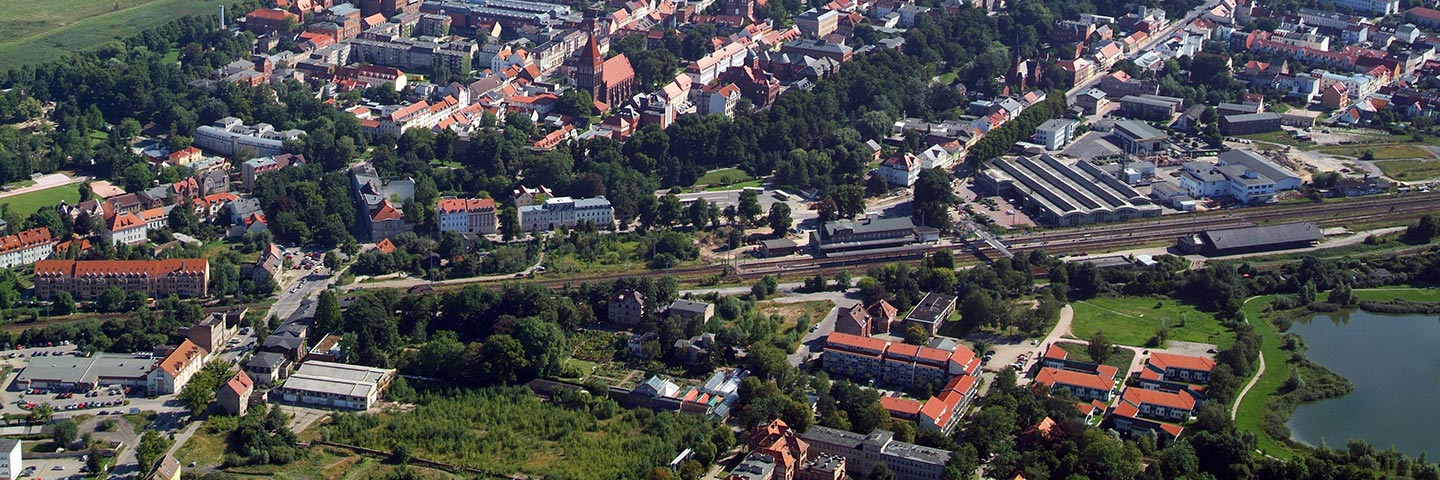News
2016
by NK
More peatland research
Two new EU projects to start in 2017
21/12/2016 In the coming year, two new EU projects will start at the Greifswald Mire Centre. In REPEAT, REstoration and prognosis of PEAT formation in fens will be studied, with a particular focus on linking diversity in plant functional traits to soil biological and biogeochemical processes. Together with the universities Warsaw (Poland) and Antwerp (Belgium), NIBIO (Norway) and the Danube Delta Research Institute (Romania), Greifswald University will carry out field research in Belgium, the Netherlands, Northeast-Germany,East-Poland and in the Danube Delta. Nationally, the project is funde by Deutsche Forschungsgemeinschaft (DFG). Very recently, also the project CLEARANCE was approved for funding. This project will develop a CircuLar Economy Approach to River pollution by Agricultural Nutrients with use of Carbon-storing Ecosystems. Consortium partners are, together with Greifswald University, two universities in Warsaw (Poland), Aarhus University (Denmark), Nijmegen University (the Netherlands) as well as the Leibniz-Institute of Freshwater Ecology and Inland Fisheries (IGB) Berlin and a Polish NGO.
by NK
Save the soil!
Support people4soil on world soil day
5/12/2016 Soils offer a lot, but do not have rights. Soils supply food, filter water, store carbon, but they are exploited, polluted and destroyed. Without healthy soils there is no habitat for humans, animals or plants. Therefore the Greifswald Mire Centre supports the People4Soil initiative. More than 400 associations have joined this European citizens' initiative. At world soil day add your voice to push the EU for specific regulations to protect the soil.
by NK
Global Peatland Initiative launched
Pushing peatlands protection for saving climate
20/11/2016 To save peatlands as the world’s largest terrestrial carbon stock leading peatland experts and institutions launched the Global Peatland Initiative at the World Climate Conference (COP 22) in Marrakech mid of November. It is a joint effort to cut greenhouse gas emissions from drained peatlands and thus make peatland protection a vital factor in meeting climate goals of the 2015 Paris agreement.
The Global Peatlands Initiative was founded by the governments of Indonesia, Peru, the Republic of Congo, UNEP, the UN Food and Agriculture Organization (FAO), the Joint Research Centre of the European Commission, CIFOR, Wetlands International, UNEP-WCMC, GRID-Arendal, Ramsar Convention on Wetlands, European Space Agency, WRI, Greifswald Mire Centre and StarVision/Sateligence.
More on www.globalpeatlands.org
by NK
Reed as Renewable Resource 2017
Register now for one week full of paludiculture!
15/11/2016 The Greifswald Mire Centre is pleased to announce an entire conference week on paludiculture from 25th to 30th September 2017 in Greifswald, Germany. It comprises a national and an international part, a day of excursions and a Sphagnum farming workshop. Submissions of abstracts for oral or poster presentations are welcome until 28th February (inclusively). Exhibition space for companies (machinery, building material, publisher etc.) and other organisations will be provided indoors and outdoors. Register for the national and/or international conference and for excursions at www.rrr2017.com and receive regular updates about RRR2017.
by NK
5 million Euro for peatland research
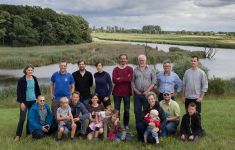
Funding from regional excellence initiative
21/10/2016 With 5 million Euro the regional excellence initiative Mecklenburg-Vorpommern is funding WETSCAPES – matter dynamics in peatland and coastal sites as basis for land use, climate impact and water protection (German ony), a joint project of Greifswald University and Rostock University. From 2017-2020 the project will improve the scientific basis of wise use of formerly degraded, rewetted peatland sites. Peat formation in percolation mires, coastal transgression mires and alder carrs in Mecklenburg-Vorpommern will get particular attention.
In total five consortia will receive each c. 5 million Euro from the regional excellence initiative. WETSCAPES was developed by the working groups Joosten, Wilmking, Kreyling and Urich at Greifswald University together with colleagues from Rostock University. Third partner is the German Aerospace Centre (DLR) Neustrelitz. Project outcomes will be communicated via the Greifswald Mire Centre.
by NK
From Kolkheti to Hankhausen
Georgians get informed about paludiculture
12/10/2016 The Kolkheti Lowland in Georgia is one of the smallest mire regions in the world with unique mire types like the ‘percolation bog’. Currently the management plans of the Kolkheti National Park and Kobuleti Protected Areas, harbouring the largest, most important and largely pristine mire areas in Kolkheti, are revised and will be updated with scientists from the Greifswald Mire Centre being involved.
Therefore a delegation of five Georgians sought information about paludiculture at the sphagnum farming pilot sites at Hankhausen, Lower Saxony, to discuss opportunities for implementation in Georgia and to assess its potential to support protection of Kolkheti mires. Delegates were Lasha Moistsrapishvili (chairman of the Agency of Protected Areas of Georgia, APA, at the Ministry of Environment and Natural Resources Protection of Georgia), Khatuna Tsiklauri (main specialist of Scientific Research and Monitoring, APA), Aleksandre Khabeishvili (director of the Kolkheti National Park, APA), Mamuka Gvilava (focal point of Integrated Coastal Zone Management of Georgia) and Izolda Matchutadze (head of Department of Conservation of Kolkheti Mires and Water Ecosystems, Batumi Shota Rustaveli State University).
Besides the 13 ha sphagnum farming site they visited the heating plant for fen biomass in Malchin, surrounding harvest areas as well as cultivation experiments of cattail near Ueckermünde in Mecklenburg-Vorpommern.
by NK
Don’t deny devastating effects of tropical peatland use!
139 scientists publish letter in Global Change Biology
06/10/2016 Following the 16th International Peat Congress (IPC) in Kuching (Sarawak), Malaysia, widely read media reported that the congress supported the view that current agricultural practices in peatland areas, such as oil palm plantations, do not have a negative impact on the environment. However, this view is not shared by many of the participants, and does not reflect the broad message conveyed by the research presented at the congress.
In an effort to correct these statements, a number of the world’s leading researchers, among them experts of the Greifswald Mire Centre, and practitioners from around the world have come together to publish a letter in Global Change Biology, one of the world’s leading environmental science journals. The 139 authors represent 115 government, academic, industry and non-governmental organizations from 20 countries. Forty of these organizations are based in Malaysia, Indonesia and Singapore; the countries most directly impacted by the adverse consequences of unsustainable management of tropical peatlands.
For more information see:
English press release and open letter to Global Change Biology Denial of long-term issues with agriculture on tropical peatlands will have devastating consequences by Wijedasa LS, Jauhiainen J, Könönen M et al. (2016)
by NK
Peatland meeting for Ramsar Convention
International workshop on Vilm
16/09/2016 Peatlands store twice as much carbon as the forest biomass worldwide and are huge source of greenhouse gases in many countries. To strengthen the role of peatlands in climate protection and the Ramsar Convention experts from politics, science and the private sector met for a three day workshop on the island of Vilm (Germany). The meeting report will cover guidelines for designating globally significant peatlands, best practice examples of restoration as well as ideas for the upcoming new Global Peatland Initiative. An excursion to the restored peatland Karrendorfer Wiesen and the first heating plant powered by fen biomass at Malchin complemented the workshop. It was jointly hosted by the Federal Agency for Nature Protection (BfN), the Secretariat of the Ramsar Convention, the Danish Nature Agency and the Greifswald Mire Centre. For more information see the press release Peatland protection is climate protection of the German Federal Agency for Nature Protection (German only).
by NK
Tiny mosses – big style!
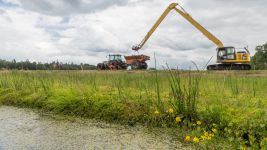
First large scale harvest of cultivated peatmoss worldwide
17/07/2016 It was a global premiere: the first mechanical harvest of cultivated peatmoss ever! At Hankhauser Moor (Lower Saxony), scientists of Greifswald University and staff of the peat company Moorkultur Ramsloh harvested the rare commodity from the joint pilot site. Being precious seed, the mosses were immediately reused and spread out, thus tripling the Sphagnum farming area. Expanding the site to a total ‘business-scale’ size of 13 ha also kicked off the MOOSWEIT-project (see for spectacular pictures the television movie).
Five years ago, the project partners had installed the peatmoss culture on former bog grassland that had been a drained and intensively used meadow for over 50 years. Mosses had established successfully and showed remarkable growth over the years. Peatmosses may be used as substrate in horticulture and thus present an alternative to peat. However, peatmoss biomass is not yet available in sufficient quantities and seed is especially scarce. Therefore, MOOSWEIT investigates large scale cultivation, mechanical harvest and regeneration of the permanent crop. The project is financed by the State of Lower Saxony, the EU (ERDF), and the German Federal Ministry of Food and Agriculture.
Moreover, Sphagnum farming allows a sustainable utilisation of rewetted bogs (paludiculture). So far, most peatlands in Germany are being drained for agricultural use. This results in immense emissions of greenhouse gases. In contrast, wet peatlands hardly emit any CO2, filter nutrient-rich water and offer habitats for rare species. For more information on the peatmoss cultivation at Hankhauser Moor see the press release of Fachagentur für nachwachsende Rohstoff (FNR) and www.sphagnumfarming.com.
by NK
Hot of the press II
„Peatland Restoration and Ecosystem Services“
27/06/2016 „Peatland Restoration and Ecosystem Services: Science, Policy, and Practice“ ist the title of the first, up-to-date and comprehensive book on peatland restoration and ecosystem services. It is 493 pages strong and unites, according to the publisher Cambridge University Press, contributions of world class experts to examine the topic from an ecological, social and economic perspective. GMC scientist may be pleased since they co-authored nine of the book’s 20 chapters. „Peatland Restoration and Ecosystem Services“ is also available as eBook.
by NK
Fire and haze force Indonesia to think big in the wet
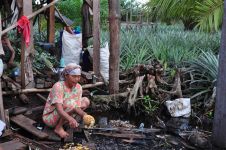
GMC’s tropical counterpart established
11/06/2016 Over two million hectare of peatland have been burning in Indonesia from August 2015 on. Precise CO2-emissions are yet to be assessed but may add up to over 10% of the world’s anthropogenic CO2 emissions in 2015 as GMC scientists roughly estimate. The economic damage of the 2015 fires exceeds US $16 billion according to early assessments of the World Bank and more than doubles the damage and losses from the 2004 tsunami. A call for urgent action which the Indonesian government understood well and adopted plans to restore ca. 2,7 million hectare of Indonesian peatlands within the next five years. To kick off ambitious the programme a workshop “Peatland paludiculture – an opportunity to reduce greenhouse gas emissions and improve livelihoods” was organised in Jakarta by the Food and Agricultural Organisation of the United Nations (FAO) and the Ministry of Environment and Forestry of Indonesia in May 2016. Prof. Hans Joosten of the Greifswald Mire Centre was invited to share the Greifswald expertise on the subject. He also visited the recently established Indonesian Centre of Excellence PLACE (Peatland Conservation and Productivity Improvement) at Sriwijaya University in Palembang, South Sumatera. The Greifswald Mire Centre and its tropical counterpart already agreed on future cooperation. An (Indonesian) student in the Greifswald study programme “Landscape Ecology and Nature Conservation” is currently supporting the Indonesian Peatland Restoration Agency in developing guidelines for rewetting prioritization.
by NK
On grandfather’s traces
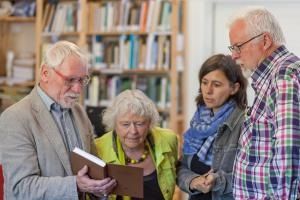
C. A. Weber’s grandson visits peatland library PeNCIL
09/06/2016 Special guests in the Peatland and Nature Conservation International Library (PeNCIL) in Greifswald: At 9th July Axel Weber, grandson of the pathbreaking peatland scientist C. A. Weber (1856-1931), and his wife paid a visit to get an impression of PeNCIL library stocks and research of the Greifswald Mire Centre. Greifswald peatland scientists greatly admire his grandfather: In 2002 John Couwenberg translated Weber’s „Über die Vegetation und Entstehung des Hochmoores in Augstumal [On the vegetation and development of the raised bog of Augstumal]” (in today’s Lithuania) into English and thus made it accessible to a wider audience. This year GMC members supported Lithuanian peatland scientists issuing a Lithuanian language edition. Since very recently, also the new book can be found at PenCIL, which is generously funded by the Bernhard and Ursula Plettner Foundation. To help Axel Weber tracking his grandfather’s traces even in Lithuania, GMC scientists also put him into contact to their Lithuanian colleagues.
by NK
Iconic peatland conservationist turns 75
Colloquium honours Michael Succow
30/04/2016 “He can fill people with enthusiasm whether they want it or not!” was one explanation for the outstanding lifetime achievement of nature and peatland conservationist Michael Succow end of April 2016. A colloquium at Greifswald University honoured the Right Livelihood Laureate on occasion of his 75th birthday. In her birthday letter German chancellor Angela Merkel congratulated Michael Succow also to the newly established Greifswald Mire Centre. Erwin Sellering, Prime Minister of the Federal State of Mecklenburg-Vorpommern (MV), in his speech stressed that the GMC strengthens the reputation of Greifswald and MV beyond state borders. Several friends and companions such as Jochen Flasbarth, State Secretary at the Federal Ministry for Environment, entrepreneur Michael Otto and Jakob von Uexküll, founder of the Right Livelihood Award, honoured the long lasting commitment of the peatland scientist.
by NK
Integrate peatlands into EU policies
Workshop on better solutions to manage peatlands in the EU framework
23/04/2016 A few months after conclusion of the Paris agreement on Climate Change, a workshop in Brussels on 19th April 2016 addressesd the importance of peatlands and organic soils in the European Union and its Member States for biodiversity and climate change. “Peatland ecosystems are still suffering from the Cinderella syndrome” Professor Hans Joosten (Greifswald University) stated. “They contain disproportionally more organic carbon than all other terrestrial ecosystems and emit enormous amounts of CO2 when drained.” Furthermore, they provide habitats for specially adapted and rare species strictly protected by the EU’s bird and habitat directives. And yet, when it comes to policymaking – climate policymaking, in particular – peatlands remain largely out of sight. This leads to poor protection and conservation.
Within the project Peatlands in the EU Regulatory Environment the Michael Succow Foundation, Partner in the Greifswald Mire Centre (GMC), and Silvestrum have assessed the impact of EU law — on the environment, agriculture, and energy — on peatlands and organic soils in Member States, with special emphasis on case studies for Poland and Estonia. They brought together senior officers from the EU Commission, Member States’ governments, NGOs, research institutes and cooperates to call for joint action to better integrate peatland management and conservation into EU policies as instruments to improve their status across Member States.
by NK
Hot of the press!
New book “Paludiculture“
19/04/2016 GMC experts Dr. Wendelin Wichtmann, Christian Schröder and Prof. Hans Joosten edited the publication “Paludiculture – productive use of wet peatlands”. On 288 pages this book, which is released by Schweizerbart Science Publishers, provides extensive information on wet peatland utilisation (paludiculture) for policy making, management, practice and science. It explains the principles of wise peatland management and encourages the worldwide implementation of paludiculture as a unique form of sustainable utilisation of organic soils. The book can now be ordered at Schweizerbart Publishers.
by NK
A tonne of Typha
Insulation from the wetland next door
31/03/2016 Using cattail (Typha) from the area next door as insulation for housing is a showcase for paludiculture currently pursued near Anklam (Mecklenburg-Vorpommern). That’s why the recent cattail harvest there was enthusiastically supported by GMC coworkers. In the end twenty big bags were stuffed to the brim. About a tonne of dry Typha biomass was the result of harvesting about half a hectare of peatland. This paludiculture flagship project was initiated by the Dutchman Aldert van Weeren. An entrepreneur in nature tourism he is currently turning an old country house into a holiday destination for nature lovers using mostly ecological building material. The passionate ornithologist and tour guide is particularly happy that the Typha from next door does not only provide local and renewable building material but also reflects nature conservation by peatland rewetting. Currently the Typha biomass is being processed for cavity wall insulation by a small factory in Prenzlau.
